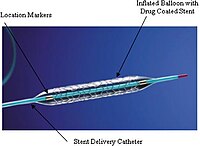
Photo from wikipedia
© Author(s) (or their employer(s)) 2022. Reuse permitted under CC BYNC. No commercial reuse. See rights and permissions. Published by BMJ. The recent 2020 European Society of Cardiology Guidelines for… Click to show full abstract
© Author(s) (or their employer(s)) 2022. Reuse permitted under CC BYNC. No commercial reuse. See rights and permissions. Published by BMJ. The recent 2020 European Society of Cardiology Guidelines for the management of acute coronary syndromes (ACS) in patients presenting without persistent STsegment elevation (NSTE) recommend an early (<24 hours) invasive strategy with class of recommendation I, level of evidence A for the following groups of patients: all patients with NSTE myocardial infarction (NSTEMI) according to the diagnostic algorithm proposed by the guidelines, patients with dynamic or presumably new contiguous ST/Tsegment changes suggesting ongoing ischaemia, patients with transient STsegment elevation and patients with a Global Registry of Acute Coronary Events (GRACE) risk score >140. This recommendation thus comprises a heterogeneous population including patients at very high risk, such as those with a GRACE score >140, as well as those with a less defined risk profile, such as the whole population of patients with NSTEMI. Does the evidence support an early invasive approach for all patients with NSTEMI? There have been several randomised controlled trials and at least four metaanalyses investigating the optimal timing of an invasive strategy in patients with NSTEACS and the summary of the general evidence suggests that compared with a delayed invasive strategy, an early invasive strategy does not reduce the overall risk of death, myocardial infarction or stroke, but it may reduce the risk of recurrent/refractory ischaemia. The findings on highrisk patients have been controversial, some studies reporting lower rates of mortality with an early invasive strategy, but with inconclusive interaction tests. In addition, the reduction in recurrent ischaemia reported in two metaanalyses was associated with moderatedtosevere heterogeneity of treatment effect, suggesting caution on data interpretation. 3 The lack of a significant difference in hard endpoints such as death, myocardial infarction or stroke between an early versus a delayed strategy suggests that the majority of patients with NSTEACS can be safely managed with a less urgent strategy. Pursuing an early invasive strategy in all patients with NSTEMI is a logistically demanding approach which requires important changes in network organisations, with the risk of exposing patients with STEMI or those with NSTEMI and signs of haemodynamic or electric instability to unjustified delays, especially on weekends or after hours when access to cath lab facilities is restrained. As the findings favouring an early invasive strategy are either controversial (drawn from post hoc analyses, mostly hypothesis generating), or are associated with high level of heterogeneity in aggregate databased metaanalyses, the extension of an early invasive strategy to all patients with NSTEMI with the top rank class recommendation may appear disproportionate to the current level of evidence. In our view, recommending a more selective approach to an early invasive strategy may be more appropriate. In this regard, the consistent observation across several trials and metaanalyses that patients with GRACE score >140 may benefit from an early invasive strategy supports an individualised approach to timing of invasive strategy in patients with NSTEMI, wherein only those at the highest risk are referred for an early intervention. 5
Journal Title: Open Heart
Year Published: 2022
Link to full text (if available)
Share on Social Media: Sign Up to like & get
recommendations!